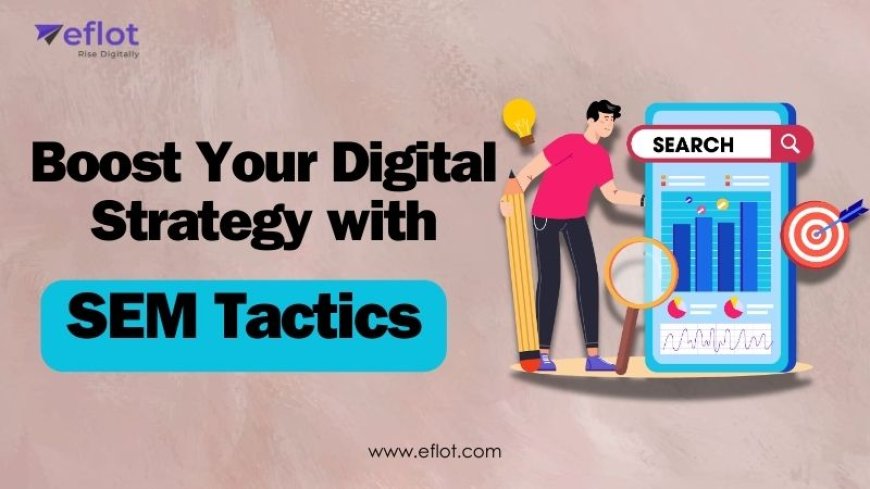Types of Search Engine Marketing in Digital Strategy
Explore various types of search engine marketing techniques that are essential for a comprehensive digital strategy.

Hey there, Know about the different types of search engine marketing in digital strategy. To improve your online presence, you need to understand the different elements of Search Engine Marketing (SEM). We'll look at the field of SEM, its different types, and how you may use them to build a strong digital strategy. The term "Types of Search Engine Marketing" is an important part of digital marketing.
What is SEM (Search Engine Marketing)?
Search Engine Marketing (SEM) is a type of digital marketing in which websites are advertised by boosting their exposure in search engine results pages (SERPs), typically through paid advertising. Unlike Search Engine Optimization (SEO), which focuses on organic search, SEM involves using paid tactics to get high search engine ranks.
Types of Search Engine Marketing
When studying Types of Search Engine Marketing in Digital Strategy, we may separate them into two categories: Pay-Per-Click (PPC) Advertising and Local SEO.
1. Pay-Per-Click (PPC) Advertising
PPC is the most common form of SEM. Here, advertisers pay a fee each time their ad is clicked. Essentially, it’s a way of buying visits to your site, rather than attempting to earn those visits organically.
-
Google Ads: Google Ads is the most popular PPC advertising system. It allows you to create ads that appear on Google’s search engine and other Google properties.
-
Bing Ads: While Google is the leader, Bing Ads (now Microsoft Advertising) is also a valuable platform, especially for targeting different demographics.
-
Display Ads: These are banner ads that appear on websites across the internet. They can be images, text, or video ads.
-
Remarketing Ads: These ads target users who have previously visited your site. They appear as the user browses other sites on the internet.
PPC advertising is extremely customized, allowing you to target certain keywords, demographics, places, and even times of day. PPC is cost-effective because of its pay-for-performance concept, which means you only pay when someone clicks on your ad.
2. Local SEO
Local SEO is another type of SEM that focuses on improving your online presence to attract more customers from relevant local searches. This is particularly important for firms that have a physical location or serve certain geographical areas.
-
Google My Business (GMB): Creating and optimizing a Google My Business page will help you get more visibility in local search results and Google Maps.
-
Local Listings: Make sure your business is listed in local directories like Yelp, TripAdvisor, and others.
-
Local Keywords: Use location-specific keywords to assist search engines in identifying your business with local searches.
Integrating SEM into Your Digital Strategy
To effectively integrate Types of Search Engine Marketing in Digital Strategy, it's essential to understand the role each type plays in your overall marketing efforts.
Keyword Research and Selection
Keyword research is the cornerstone of both PPC and Local SEO. Use tools like Google's Keyword Planner or WordStream’s Free Keyword Tool to find relevant keywords for your business. Focus on commercial and transactional keywords that signal purchase intent.
Creating Compelling Ad Copy
Your ad copy needs to be compelling and relevant. For PPC, this means writing headlines and descriptions that include your target keywords and convey your value proposition. Use action-oriented language to encourage clicks.
Landing Page Optimization
Once you have attracted visitors through your ads, ensure your landing pages are optimized for conversions. This means having a clear call to action, a user-friendly layout, and relevant content that matches the intent of your ads.
Tracking and Analytics
Use tools like Google Analytics and Google Ads to track the performance of your SEM campaigns. Monitor metrics like click-through rates (CTR), conversion rates, and return on investment (ROI). Adjust your campaigns based on these insights to continually improve performance.
Benefits of Search Engine Marketing
Integrating Types of Search Engine Marketing in Digital Strategy offers several benefits:
-
Immediate Results: Unlike SEO, which can take months to show results, SEM can drive traffic to your site almost immediately after your campaigns go live.
-
Targeted Advertising: SEM allows for precise targeting based on keywords, demographics, location, and more, ensuring your ads reach the right audience.
-
Cost Control: With PPC, you have control over your budget, only paying for actual clicks, which allows for effective cost management.
-
Measurable ROI: Detailed analytics provide insights into which ads are performing best, helping you to optimize your spending and maximize ROI.
Common Challenges and How to Overcome Them
Considering its advantages, SEM is not without drawbacks are some common ones and ways to overcome them.
-
High Competition and Costs: Highly competitive keywords can drive up costs. Combat this by targeting long-tail keywords and continually optimizing your ad campaigns for better quality scores.
-
Ad Fatigue: Users can become blind to ads if they see the same ones repeatedly. Regularly refresh your ad creatives and test different variations to keep your audience engaged.
-
Maintaining High-Quality Scores: Quality scores affect your ad’s position and cost. Improve your scores by ensuring your ads and landing pages are highly relevant to the keywords you're targeting and providing a great user experience.
Understanding the Different Types of Search Engine Marketing in Digital Strategy is important for any organization looking for success online. By effectively using PPC and Local SEO, you may increase your visibility, create targeted traffic, and achieve important ROI. Remember that the secret to SEM success is ongoing optimization and getting up to date on the newest digital marketing trends and best practices.
By following these rules and continuously improving your approach, you'll stay ahead of the competition and experience consistent growth in your online presence. The variety and flexibility provided by the various types of Search Engine Marketing make them important tools in your digital marketing Strategy.




































